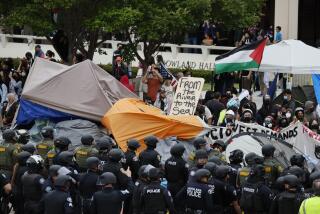‘Day of Decency’ : Radio: The 18-hour anti-censorship program originated at UC Irvine will be broadcast simultaneously by 12 California college radio stations on Monday.
- Share via
One dozen California college radio stations will join together Monday to broadcast a statewide, 18-hour anti-censorship special titled “Day of Decency.”
The free-speech marathon--scheduled to run from 6 a.m. to midnight--will feature controversial music, interviews and spoken-word performances by a diverse assortment of artists, including poet Allen Ginsberg, former Dead Kennedys’ founder Jello Biafra and Ian Mac-Kaye, from the punk rock band Fugazi.
“Censorship isn’t just about burning books,” MacKaye said Friday in a phone interview from Washington. “There are less blatant restrictions in force now on art and music and other forms of creative expression. It’s everywhere and it must be exposed.”
“Day of Decency,” the brainchild of KUCI-FM music director Todd Sievers and promotions director Danielle Michaelis at UC Irvine, was created to protest the current 24-hour “indecency” ban imposed last year by the Federal Communications Commission.
Before the indecency ban, the FCC permitted adult-oriented themes to be aired without restriction from 12 to 6 a.m. Under current regulations, radio and television stations airing “indecent” programming at any hour can be fined as much as $10,000 per violation.
“College radio used to be considered a haven for free thinking and alternative voices,” Sievers said. “There was a time when we weren’t afraid to push the rules to the limit. Most people think college radio is still the free-form experimental medium it used to be. But that’s just not the case anymore. Now we’re being censored.”
Because one “indecency” fine could potentially wipe out the financial resources of any nonprofit campus station, Sievers said, college radio programmers now screen every recording, banning approximately one dozen potentially offensive tunes per week and deleting questionable passages from many other explicit songs before airing them.
“I don’t think most people listening to the radio have any idea what restrictions we operate under,” Michaelis said. “We created the ‘Day of Decency’ to inform the public about how bad things have gotten and to motivate them regarding what they can do to reverse the tide.”
The daylong symposium will feature segments documenting historical court and congressional battles involving banned art, music, books and film. Shows on media self-censorship and the “free-speech chill” factor will also be presented.
Radio stations participating in the statewide broadcast include: KUCI in Irvine, KALX in Berkeley, KCSB in Santa Barbara, KCPR in San Luis Obispo, KDVS in Davis, KSDT in San Diego, KUCR in Riverside, KZSC in Santa Cruz, KFJC in Los Altos Hills, KCSC in Chico and KLA and KXLU in Los Angeles,
On Tuesday, the University of California Radio Network will also sponsor “Day of Decency” fairs with live music, art exhibitions and informational booths at UC campuses in Berkeley, Davis, Irvine and San Diego.
Jello Biafra, the punk entrepreneur who successfully fought a rock music-related obscenity prosecution four years ago in Los Angeles, said that he hoped the program might spark collegiate interest in constitutional rights.
“The only way we can put a stop to the cocksure recklessness of government censorship is to begin passing information among ourselves through efforts like this,” Biafra said in a phone interview from his San Francisco home. “The more facts we put out in defiance of regulations restricting free speech, the better.”
More to Read
The biggest entertainment stories
Get our big stories about Hollywood, film, television, music, arts, culture and more right in your inbox as soon as they publish.
You may occasionally receive promotional content from the Los Angeles Times.










